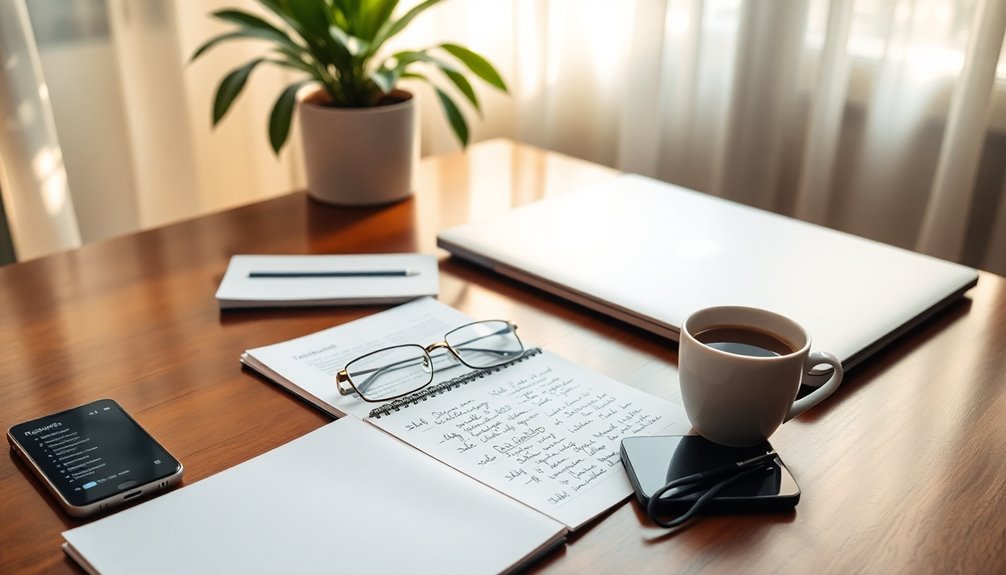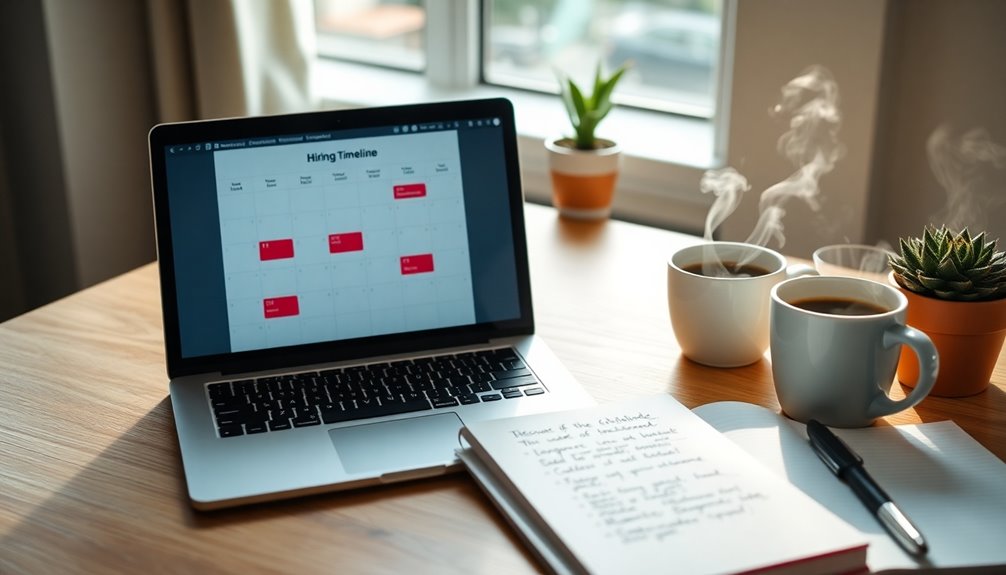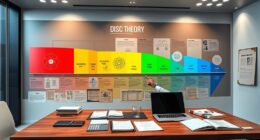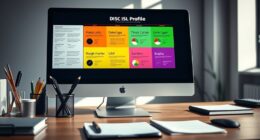After a job interview, follow these steps to enhance your chances of securing an offer. Start by sending a thank-you note within 24 hours, expressing genuine gratitude and referencing specific points from your conversation. Reflect on your performance to identify strengths and areas for improvement. While you wait, keep job searching and networking to maintain momentum. Request feedback on your interview to show your commitment to growth. Finally, stay positive and patient, as hiring decisions can take time. For deeper insights and additional strategies, you might want to explore the upcoming steps that can further aid your job search success.
Key Takeaways
- Send a personalized thank-you note within 24 hours, expressing gratitude and referencing specific discussion points from the interview.
- Reflect on your interview performance to identify strengths and areas for improvement, documenting insights for future opportunities.
- Maintain momentum in your job search by applying to new openings and networking regularly to expand your connections.
- Follow up with interviewers for feedback to demonstrate your willingness to learn and adapt, fostering ongoing communication.
- Stay informed about industry trends and company news to showcase enthusiasm and preparedness for future interactions.
Show Gratitude

When you finish an interview, don't underestimate the power of showing gratitude. Sending a thank-you note within 24 hours is a best practice that 70% of employers appreciate. This simple gesture can set you apart from other candidates. In your thank-you note, express your genuine gratitude for the interviewers' time and insights. Reference specific points from your conversation to show you were engaged and attentive. This personalization can create a lasting positive impression.
Make sure to reiterate your interest in the position, emphasizing how your skills align with the company's needs. If applicable, consider including relevant articles or recommendations that demonstrate your ongoing engagement with the industry or role. This not only adds value but also keeps the conversation going.
Reflect on Your Performance

Right after your interview, take a moment to analyze your responses while the details are still fresh. Identify your strengths and weaknesses to understand what went well and what needs improvement. This reflection will help you plan for future interviews and refine your approach.
Analyze Interview Responses
Post-interview reflection is essential for honing your performance in future job opportunities. Immediately after the interview, take some time to document your thoughts and feelings. This helps guarantee an accurate reflection of your interview performance. Analyze your responses to job interview questions, noting which answers resonated well and which could use improvement. Pay attention to any feedback, particularly non-verbal cues from the interviewers that might indicate their interest or concern.
To assist in your analysis, here's a table to summarize your insights:
| Question Asked | Your Response | Reflection |
|---|---|---|
| Tell me about yourself. | Engaging and concise. | Good connection, keep it brief. |
| Why do you want to work here? | Passionate but too long. | Shorten response, focus on fit. |
| Describe a challenge. | Clear example provided. | Strong answer, keep it up. |
| How do you handle stress? | Mentioned techniques but vague. | Provide specific examples. |
| What are your strengths? | Confident but generic. | Tailor to the role. |
Use these insights to refine your techniques and create a lasting impression in your next interview.
Identify Strengths and Weaknesses
Reflecting on your interview performance allows you to pinpoint specific strengths and weaknesses that can enhance your future endeavors. Take the time right after the interview to jot down your thoughts and feelings while they're fresh. This immediate self-assessment helps you analyze your responses and identify strengths, like your effective communication skills or problem-solving abilities. It's also essential to recognize areas where you might've struggled with clarity or confidence.
Consider how your expectations matched the actual interview experience. This alignment can reveal your excitement level about the job and how well you fit within the company culture. If certain questions lingered in your mind, note them down; these can guide your follow-up communication, showing your continued interest in the position.
Engaging in this self-reflection not only sharpens your insights but also informs your future job search strategies. By understanding your strengths and weaknesses, you can refine your approach and boost your performance in subsequent interviews. Ultimately, this process sets you up for greater success in landing the job you desire.
Plan for Future Interviews
A solid plan for future interviews starts with honest self-reflection on your recent performance. Immediately after the interview, jot down your thoughts and feelings. This allows you to capture insights while they're fresh. Assess how well your responses aligned with the job requirements and pinpoint areas for improvement.
Next, gauge your enthusiasm for the role. Does it fit your career goals? Consider any follow-up questions or topics that went unaddressed. Prepare these for your next discussions. Use your reflections to refine your interview strategies, tailoring your preparation for similar roles in your job search.
Here's a simple table to guide your reflection:
| Reflection Area | Action Steps |
|---|---|
| Performance | Document thoughts post-interview |
| Alignment with Role | Evaluate responses against requirements |
| Future Preparation | Prepare follow-up questions |
Additionally, don't forget to send a thank you note to express your appreciation. This small gesture can positively influence the hiring process, showcasing your professionalism and interest in the position. Your reflections will guarantee you're better prepared for your next opportunity.
Keep Job Searching

In the competitive landscape of job searching, keeping your momentum is essential. As a job seeker, it's important not to put all your eggs in one basket after an interview. The average job search can take anywhere from 3 to 6 months, so continuously applying to new job openings diversifies your opportunities. Set specific weekly goals, like submitting applications to at least five positions or networking with three industry contacts. This structured approach keeps your job search active and focused.
Don't forget to explore various job boards, company websites, and industry-specific platforms. You'll uncover positions that align with your skills and interests. Attending networking events, career fairs, and industry conferences can also connect you with potential employers and provide valuable insights into job market trends.
Additionally, regularly updating your resume and LinkedIn profile is essential. Highlight new skills, experiences, and accomplishments to present the best version of yourself. Following this career advice not only keeps your search proactive but also increases your chances of securing job offers. Remember, persistence is key in this journey! To further enhance your productivity during your job search, consider implementing remote work strategies that can help you stay organized and focused.
Request Feedback

After your interview, it's essential to know when and how to request feedback. Ask specific questions to gain insights that can help you improve for future opportunities. Remember, using this feedback effectively can greatly boost your job search and professional growth.
Timing for Requesting Insights
Waiting a week or two post-interview can greatly enhance your chances of receiving meaningful feedback. This timeframe allows the employer to finalize their decision-making process. If you reach out too soon, you might risk coming off as impatient or intrusive.
When you do decide to follow-up, make certain your communication is polite and expresses gratitude for the opportunity to interview. A simple "thank you" can leave a lasting positive impression. In your message, mention specific aspects of the interview or the role that genuinely intrigued you. This shows that you're not just looking for feedback but are also invested in the position.
If you don't hear back right away, don't be discouraged. It's normal for employers to take their time. Should the outcome be unfavorable, don't shy away from asking for constructive criticism on your interview performance. This feedback can be invaluable for your future endeavors.
Lastly, maintaining professionalism throughout your follow-up can keep the door open for future opportunities with the company, even if you weren't selected this time. Your approach can set the stage for potential roles down the line.
Specific Questions to Ask
To gain valuable insights from your interview experience, it is essential to ask specific questions when requesting feedback. Sending a follow-up email within 24 hours is an excellent opportunity to express gratitude while also seeking insights from the hiring manager. Consider asking questions like, "What areas do you think I could improve upon?" or "What strengths did you notice in my interview?" This targeted approach not only shows your commitment to personal growth but also demonstrates professionalism, as research indicates that 70% of employers appreciate job candidates who seek feedback.
When crafting your message, frame your inquiries positively. Emphasize your enthusiasm to learn and improve, which can leave a favorable impression on the hiring manager. If you haven't received a response after a few weeks, a polite follow-up can reaffirm your interest in the position and keep the lines of communication open for valuable feedback. Remember, asking for feedback can help you refine your interview skills and better prepare for future opportunities, making it a worthwhile endeavor in your job search journey.
Utilize Feedback for Improvement
Requesting feedback isn't just about hearing what went well; it's an opportunity to refine your approach and enhance your interview skills. When you reach out for feedback, you gain significant insights into your performance, helping you identify strengths and areas for improvement. Employers appreciate candidates who actively seek feedback, demonstrating a proactive mindset that can leave a lasting impression.
Be specific in your request. Ask about particular aspects of the interview, like your responses to certain questions or your overall fit for the role. This clarity shows your commitment to growth and professionalism. Even if you faced rejection, a follow-up for feedback can be an excellent way to express your willingness to learn and adapt, keeping you in consideration for future openings.
A well-crafted feedback request can also open doors for ongoing communication with hiring managers. Maintaining this relationship may lead to new job opportunities down the line. Embrace the chance to learn from your interviews; it's a crucial step towards securing the offer you want. By utilizing feedback effectively, you're not just improving yourself; you're also enhancing your chances in the competitive job market.
Negotiate Responsibly

Negotiating your salary can feel intimidating, but approaching it responsibly is key to achieving a favorable outcome. Start by doing your homework—research salary ranges in your industry to boost your confidence during salary negotiations. About 58% of candidates who prepare this way report feeling more assured. Transparency is essential; it fosters trust with employers, and 70% of candidates who negotiate their salary receive better offers, according to PayScale.
Communicate with a single point of contact to avoid mixed messages, ensuring clarity throughout the process. Remember to maintain professionalism; 80% of employers value candidates who negotiate respectfully and effectively.
Don't just focus on salary—engage in discussions about benefits like flexible work arrangements or professional development opportunities. These can enhance your overall compensation package considerably. Additionally, understanding your credit score can help you make informed decisions regarding salary negotiations and future financial planning.
Understand the Hiring Timeline

Understanding the hiring timeline is essential for your job search. It helps you plan your follow-up strategy and keeps you engaged without coming across as overly enthusiastic. By asking about the expected response time during the interview, you can set realistic expectations and manage your job search effectively.
Company Response Timeline
Maneuvering the company's hiring timeline is essential for any candidate enthusiastic to secure a position. Recruitment processes can vary, often taking days to weeks based on the organization's size and urgency. Understanding this helps you manage your expectations and plan your follow-up.
During your interview, make sure to ask about the expected timeline for feedback and decisions. Many companies conduct multiple rounds of interviews, which can stretch the hiring timeline. Patience is key, but being proactive can demonstrate your interest.
Here's a quick overview of typical response timelines:
| Stage of Hiring | Typical Duration |
|---|---|
| Initial Interview | 1-2 weeks |
| Final Decision | 1-4 weeks |
| Offer to Start Date | 2-3 weeks |
Research shows that about 70% of employers appreciate candidates who follow up within a week. This reinforces your interest without being pushy. By being aware of the company's hiring timeline and respecting it, you'll enhance your overall impression with your potential employer.
Follow-Up Timing Strategy
How can you effectively time your follow-ups during the hiring process? Understanding the company's hiring timeline is vital. Most organizations take anywhere from a few days to several weeks to decide, so knowing this can help you plan your communications wisely.
After your interview, send a follow-up email within 24 hours. This shows your enthusiasm for the position and keeps you fresh in the interviewer's mind. However, pay attention to any specific timelines mentioned during the interview. If the employer says they'll contact you within a certain period, wait until that timeframe has passed before reaching out. This indicates you're respectful of their process and not overly pushy.
Research suggests that 70% of employers appreciate a follow-up message, making it a significant step in maintaining visibility. Keeping track of the hiring timeline not only helps you time your follow-ups but also allows you to balance your efforts with continued job searching. This way, you won't feel overly dependent on just one opportunity. By timing your follow-ups strategically, you'll enhance your chances of securing the offer.
Follow Up Appropriately

Following up after a job interview can set you apart from other candidates and demonstrate your enthusiasm for the role. Sending a follow-up email within 24 hours can notably boost your visibility, as 70% of employers appreciate timely messages. Here's how to follow up appropriately:
- Express Gratitude: Start your email by thanking the interviewers for their time and the opportunity to discuss your career.
- Personalize Your Message: Reference specific topics you discussed during the interview to show you were engaged and genuinely interested.
- Reaffirm Your Interest: Clearly state your enthusiasm for the position and why you believe you're a great fit for the team.
- Be Mindful of Timing: Consider the company's hiring timeline; patience can demonstrate professionalism rather than desperation.
A concise thank-you note can leave a lasting impression without overwhelming the recipient. You can also leverage professional networks like LinkedIn for follow-ups, helping to maintain relationships and keep you top of mind for future opportunities. Your follow-up email is your chance to shine, so make it count!
Maintain Professional Connections

Maintaining professional connections is essential, especially after a job interview, as these relationships can open doors to future opportunities. Start by sending a personalized email within 24 hours to thank your interviewers for their time and insights. This gesture not only shows appreciation but also reinforces your interest in the company.
To further maintain relationships, consider connecting on LinkedIn. Remember, 85% of jobs are filled through networking, so keep those connections strong. Engage with the company's social media content—like or share their posts—to show you're still interested. Additionally, many companies are increasingly prioritizing skills over geographic location, making it even more important to stay connected with your network.
Here's a quick guide to help you maintain connections:
| Action | Purpose | Frequency |
|---|---|---|
| Send thank-you emails | Show appreciation and interest | Within 24 hours |
| Connect on LinkedIn | Strengthen professional relationships | After interviews |
| Engage on social media | Stay visible and involved | Regularly |
| Check-in with interviewers | Share updates and relevant articles to stay top of mind | Every few months |
Gently remind your connections of your professional journey, and you'll remain on their radar for future opportunities.
Prepare for Future Interviews

Preparing for future interviews is essential for building on your experiences and improving your chances of success. By refining your approach, you'll enhance your interview performance and stand out to potential employers. Here are four steps to help you prepare effectively:
- Review Feedback: Go over the job description and your previous interview performance. Identify areas where you can improve and refine your responses for future interviews.
- Practice with a Friend: Engage in mock interviews with a friend or mentor. This practice will boost your confidence and help you deliver clear, concise answers to common interview questions.
- Record Feedback: Keep a record of the feedback you receive from past interviews. This will allow you to adjust your approach and address any recurring concerns or questions that interviewers may have.
- Stay Informed: Keep yourself updated on industry trends and company news. This knowledge will demonstrate your enthusiasm and commitment to the field, making you a more appealing candidate. Additionally, understanding financial metrics can give you an edge in discussing the company's performance and future opportunities.
Engaging with career coaches can also provide invaluable insights and constructive critique to further enhance your preparation.
Stay Positive and Patient

After honing your interview skills, it's important to focus on your mindset during the waiting period. Staying positive can enhance your mental well-being and keep your motivation high in your job search. Research shows that candidates who remain optimistic are often viewed more favorably by employers, which could influence hiring decisions in your favor.
Patience is essential during this time, as recruitment processes can take several weeks or even months. While you wait, don't hesitate to stay proactive in your job search; this approach can open up additional opportunities. By diversifying your applications and not fixating on a single job outcome, you'll increase your chances of success across multiple roles.
Keeping a hopeful mindset also helps mitigate the emotional impact of any potential rejections. Instead of dwelling on what didn't work out, focus on what you can learn from each experience. This resilience allows you to bounce back and continue seeking the right fit. Remember, every application and interview is a step closer to your goal, so embrace the journey with positivity and patience.
Frequently Asked Questions
How to Ensure You Get the Job After an Interview?
To guarantee you get the job after an interview, send a personalized thank-you email within 24 hours. Mention specific topics you discussed to show your genuine interest. Stay engaged with the company on social media and connect with interviewers on LinkedIn, keeping you fresh in their minds. If you don't get the offer, request feedback to improve. Reflect on your performance and adjust your strategies for future opportunities. Your proactive approach makes a difference!
What Is an Appropriate Next Step After an Interview?
After an interview, your next step is to send a thank-you email within 24 hours. It shows appreciation and keeps you top of mind for the employer. Personalize your note by mentioning specific topics you discussed, reinforcing your interest in the role. If you haven't heard back in a week or two, a polite follow-up email can demonstrate your ongoing enthusiasm. Use this time to reflect on your interview performance, too.
What Is the Next Process After an Interview?
After an interview, it's like waiting for a pot to boil—patience is key. You should ask about the hiring timeline to know when to expect feedback. Sending a thank-you email within 24 hours shows your appreciation and reinforces your interest. Stay in touch with the recruiter to stay updated. If you don't get the job, don't hesitate to ask for feedback to improve your future interviews. Keep applying elsewhere to stay proactive!
What Is the Protocol After an Interview?
After an interview, you should send a thank-you email within 24 hours. This shows gratitude and reinforces your interest in the position. Personalizing your note by mentioning specific topics discussed can make a strong impression. If you haven't heard back in a couple of weeks, consider sending a polite follow-up email to inquire about your application status. Always maintain professionalism in your communications, as it can open doors for future opportunities.
Conclusion
After a job interview, think of yourself as a ship steering through the seas of opportunity. Show gratitude to those who guided you, reflect on your journey, and keep your sails set for new horizons. Request feedback to adjust your course, and negotiate with the wisdom of a seasoned captain. Follow up with grace, maintain connections like stars in the sky, and prepare for future voyages. Stay positive; every wave brings you closer to your destination.
Felicity, our Author, pens in-depth articles and guides that delve into the heart of personal discovery. Her narrative-driven approach weaves together theory, practice, and personal anecdotes, making the journey of self-exploration both relatable and inspiring. Felicity’s contributions help illuminate the path for those seeking a deeper understanding of themselves and their relationships.










